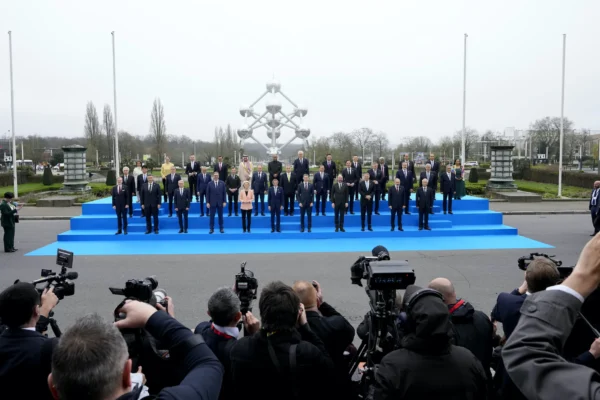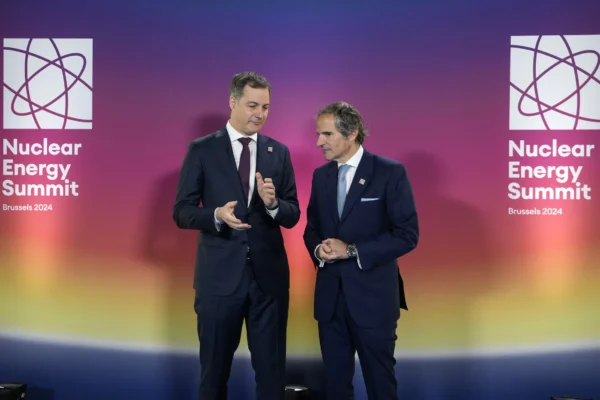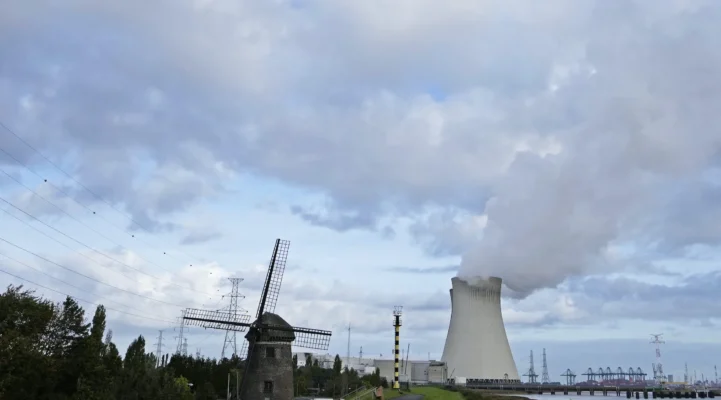Leaders and representatives of more than 30 countries met in Brussels on Thursday and pledged to use nuclear energy. They also discussed its potential as a primary source of electricity after the dire consequences of the Russia-Ukraine war.
The summit, co-chaired by the Prime Minister of Belgium Alexander De Croo and the Director General of the International Atomic Energy Agency Rafael Mariano Grossi, was the highest-level meeting exclusively focused on nuclear energy.
“We have to do everything possible to facilitate the contribution of nuclear energy,” Mr. Grossi said. “It is clear: Nuclear is there. It has an important role to play,” he added.
Leaders of the European Union’s government, France, Belgium, Poland, Hungary, the Czech Republic, and others, as well as representatives of other countries, including the United States, Japan, and the United Kingdom, gathered next to the 1958 Atomium, the 335-foot-tall construction of nine iron atoms. Atomium sought to promote the peaceful use of nuclear power in the wake of the nuclear bomb explosions at the end of World War II and their use as a geopolitical deterrent ever since.
In a joint statement, the countries committed “to work to fully unlock the potential of nuclear energy by taking measures such as enabling conditions to support and competitively finance the lifetime extension of existing nuclear reactors.”
The statement also commits to the construction of new nuclear power plants and the early deployment of advanced reactors, including small modular reactors worldwide, while maintaining the highest levels of safety and security.

Nuclear power fell out of favor in Europe due to safety concerns following Japan’s Fukushima nuclear accident in 2011. This accident prompted Germany to immediately shut down six nuclear plants and phase out its remaining reactors. The last three were shut down in April 2023.
However, the need to find alternatives to Russian gas following the Russia-Ukraine war in 2022 and the European Union’s commitment to cut net greenhouse gas emissions by 55 percent by 2030 has renewed interest in nuclear power.
However, European countries remain divided on whether to promote nuclear energy. Two entrenched camps exist—one led by France, which believes nuclear expansion is crucial, and the other including anti-nuclear countries Austria and Germany, which want the focus to stay on renewable sources such as wind and solar.
Hungary’s Prime Minister Viktor Orban said Europe must free itself of being “a hostage of ideological approaches.”
Fatih Birol, executive director of the International Energy Agency, said, “Without the support of nuclear power we have no chance to reach our climate targets on time. Renewables will play the major role in terms of electricity, especially solar supported by wind and hydropower,” Mr. Birol said. “But we also need nuclear power especially in those countries where we don’t have major renewable potential.”
“We have to do whatever we can to increase the current nuclear capacity, which is currently only less than 10 percent of global electricity generation,” he said.

Mr. De Croo suggested involving the European Investment Bank in financing new reactors.
“There is no lack of private financing. Quite the contrary, what lacks is the right circumstances to get private financing going and a multilateral bank should be a lever to multiply investment,” he said.
In response to a question, Mr. De Croo also said that European nuclear industry supply chains needed to disconnect from Russia as fast as possible, while balancing existing operations.
Several European countries depend on Russian technology and uranium to supply and maintain their reactors.
The United States, too, is looking to revive nuclear.
“We’re supporting the French initiative to encourage the World Bank and other development banks to eliminate the restriction on funding nuclear,” John Podesta, senior advisor to the U.S. President for clean energy, told reporters.
He added that Congress recently approved $2.7 billion to restart an enrichment program, particularly for advanced fuels such as helium.
Nuclear France
In Europe, France is the leader in nuclear energy and accounts for about two-thirds of its overall provisions.
French President Emmanuel Macron said that “thanks to the nuclear model, France is one of the few countries that exports its electricity, which is an opportunity.”
“We should be much more concerned about, for example, CO2 emissions, which have a direct impact on you and me and on our health every day,” he said. “Our priority must be to get out of coal and gas and move toward nuclear power and renewable energy.”
Even a year before the Russia-Ukraine war, European Commission President Ursula von der Leyen surprised the world by saying the EU needed nuclear energy as a “stable source” of energy. Nuclear was afterward labeled by the EU as a “sustainable” investment.
By 2023, France was leading a European policy-focused group of a dozen countries, including Poland, Bulgaria, Finland, and the Netherlands.
Their efforts bore fruit, as last June France secured a change to EU renewable energy rules to recognize nuclear power as a way to produce low-carbon hydrogen, according to AFP.

Building nuclear plants takes many years, and projects are often marred by cost and deadline overruns. Environmentalists stressed that point by holding demonstrations outside the summit center.
“Nuclear, all the evidence shows, is too slow to build. It’s too expensive. Much more expensive than renewables,” said Lorelei Limousin of Greenpeace.
Reuters and The Associated Press contributed to this report.

